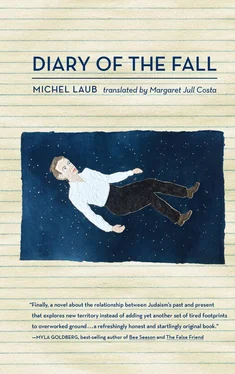10.
What can change in a matter of months? A ten-centimeter growth spurt. A deeper voice. An older face. When you’re fourteen, you can easily get strong doing push-ups and weight lifting, and that in itself gives you extra confidence if anyone should make a snide comment about you, and just the way you turn your head will determine whether what the person said will be passed off as a joke or never again repeated, and just the way you walk and lean casually on the speaker and behave with girls at a party will determine how the rest of your year will go, you who were in the majority at the school where you both studied before, you who had more friends at the school where you both studied before, who did what you liked throughout your years at the school where you both studied before, Jew , but if all that ends, you become the one dependent on your friend, the one who gets invited to a classmate’s house because of him, the one they put up with, and you have to accept the fact that they only talk to you because he does.
11.
I doubt that João ever read If This Is a Man , and it’s possible that he would never have considered what an Auschwitz survivor would say about being diagnosed with Alzheimer’s, knowing that in a few years he would forget everything, childhood, school, the first time a neighbor was arrested, the first time a neighbor was sent to a concentration camp, the first time you heard the name Auschwitz and realized that it would stay with you for a very long time, your fellow prisoners in Auschwitz, the guards at Auschwitz, the people who died in Auschwitz, the meaning of that word disappearing into a limbo outside the eternal present that will gradually become your sole reality.
12.
I was the one who told my father he had Alzheimer’s. I talked to him about the initial stages of the illness, about the long period of time that would pass before the symptoms got worse, and that was all I could do because in two clicks of a mouse my father had access to any website describing the condition in detail: photos of patients, always the same blank gaze and the sense that something is missing from the photo, the relatives out of sight, behind the camera in the hospital room or kilometers away if possible, in another city so as not to run the risk of having to make a Sunday visit and find their father reduced to a pair of blue pajamas, a figure with short hair, a sheet and the gaze of someone who no longer knows what a camera or a photograph is, like a baby in front of a mirror with no notion yet that the reflection contains the image we have and will have of ourselves until everything begins to change.
13.
The image I had of myself on the day I told my father he had Alzheimer’s was this: a man nearing forty, who had been reasonably successful in his career, who had published books that had enjoyed a reasonably warm critical reception, and who managed to get on reasonably well with the people to whom he was close, writers, publishers, translators, agents, journalists or friends he had lunch with twice a year but whose wife’s or children’s names he didn’t know, friends whose habits and plans and conversations had long since ceased to interest him.
14.
At nearly forty, I was on my third marriage. The first lasted three years. I was twenty-one when we met and I made all the mistakes one would expect in that situation. It was a prolonged period of mutual incomprehension, and now I feel neither regret nor pain nor tenderness when I think of that time.
15.
The second marriage lasted even less time, two years out of a total of six years spent together, and which ended in more or less the same way, but afterward I would often remember the apartment we lived in, the trips we made, the friends we had in common, the things she would tell me about her work and that I would tell her about mine, the dinner parties we gave, the Sunday mornings spent reading the paper, me snuggled up close to her beneath the sheets one night when the hail was beating so hard against the shutters we thought the building was going to collapse, her family, her clothes, the films and books she liked, her voice, her hair, the shape of her fingers, the little groan she gave when she stretched, and all the infinite number of details that were lost because we never spoke to each other again.
16.
None of the women I married knew anything about João. Once I grew up, I never talked about him or about my first weeks at the new school, the new classmates who drank and smoked hash and sniffed glue and benzine, and went out in the late afternoon setting fire to litter bins and stealing tokens from public phone boxes. You have to rip the whole apparatus off the wall, leaving only a stub of cable, and you stand close by the classmate who’s doing this, then run off with him to a safe place where someone with a screwdriver and a hammer and a chisel breaks through the outer shell into the box containing a handful of tokens that will never be of any use, and although none of that should have struck me as new in relation to what I’d more or less experienced during the previous year, it did. The new school was a hostile environment in a different way, and that wasn’t just because of the way my classmates looked at me and talked to me, but also the way in which João dealt or appeared to deal with it.
17.
João never talked to me in detail about the months that followed the fall. He forgave me so easily, became my friend so easily, accepted my decision to go with him to the new school, a thirteen-year-old saint who never expressed the least surprise at what I’d done and never told me what he really felt during that time: if he had dreams too, if he also relived the moment of the fall each night, if the thud on the floor had sounded the same to him as to me, and if seeing the scene from below had the same effect — if, in his dream, the people at the party were wearing tallits and kippahs, like an army formed up around the throne of David, with me standing above the throne holding an open Torah, and it’s then that the door opens and João sees his father enter pushing a wheelchair, his father surrounded by nurses who all look at João and smile and put João in the wheelchair and the next scene is João in the classroom with his atrophied legs and his toes turned in and his arms grown strong from pushing the wheelchair back and forth.
18.
João never knew that I fought with my father because of all this. That I hurled a Scotch tape dispenser at him because of all this. That for a moment there was a chance I could have hit my father on the head and injured his face, resulting in an operation on the cheekbone under general anesthetic, leaving him with one eye that he would never be able to open again and all because my father — with his stories about the Holocaust and the Jewish renaissance and the obligation every Jew in the world had to defend himself using whatever means he had — was in some way responsible for what happened to João, making him the enemy who will always be there before you and who will always be in your thoughts because now he’s in a wheelchair.
19.
I never told João that the quarrel with my father was the closest physical contact I’d had with him for thirteen years. On the day I found out he had Alzheimer’s, I went to a bar and ordered a whisky and then another and then several more and ended up leaving the bar and sleeping on a park bench. When I woke it was broad daylight and I was filled with a feeling of immense weariness when I thought about how I was going to break the news to my father, and I remember that one of the things I thought was whether or not I would touch him when I gave him the news, whether I would take his hand or place my hand on his shoulder or give him a hug or attempt a smile indicating a minimum of optimism about the initial prognosis.
Читать дальше












